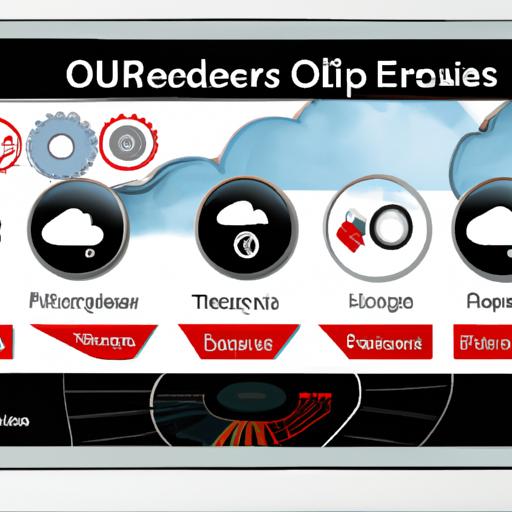What is Oracle Cloud ERP: An Introduction to the Leading ERP Solution
In the fast-paced world of business, efficient management of operations is crucial for success. This is where Enterprise Resource Planning (ERP) systems come into play. ERP systems streamline and integrate various business processes, enabling organizations to enhance productivity, streamline workflows, and make informed decisions. One such leading ERP solution is Oracle Cloud ERP.
Why are ERP systems important? ERP systems act as a backbone for businesses, providing a centralized platform to manage a range of activities such as finance, supply chain, and human resources. By consolidating data and automating processes, ERP systems ensure seamless collaboration and enable organizations to optimize their resources effectively.
Introducing Oracle Cloud ERP: Oracle Cloud ERP stands out as a comprehensive and cutting-edge solution that empowers organizations to transform their operations. With its robust features and functionalities, Oracle Cloud ERP simplifies complex business processes, accelerates growth, and drives innovation.
Oracle Cloud ERP encompasses a wide range of modules, including financial management, supply chain management, and human capital management. These modules work seamlessly together, providing organizations with a holistic view of their operations and enabling them to make data-driven decisions.
Benefits of Oracle Cloud ERP: Implementing Oracle Cloud ERP offers numerous advantages for businesses. It provides real-time insights into financial performance, allowing organizations to monitor their revenue, expenses, and profitability accurately. With its supply chain management capabilities, Oracle Cloud ERP enables organizations to optimize inventory levels, streamline procurement processes, and enhance supplier relationships. Additionally, the human capital management module helps organizations manage their workforce efficiently, from recruitment and onboarding to talent development and performance management.
In conclusion, Oracle Cloud ERP is a powerful ERP solution that revolutionizes the way organizations manage their operations. By leveraging its comprehensive modules and advanced features, businesses can enhance their efficiency, drive growth, and stay ahead in today’s competitive landscape. In the following sections, we will delve deeper into the key components, implementation strategies, and the advantages of Oracle Cloud ERP over traditional on-premises solutions. So, let’s explore the world of Oracle Cloud ERP together!
Understanding Oracle Cloud ERP
Definition and Concept of Oracle Cloud ERP
Oracle Cloud ERP is a cloud-based Enterprise Resource Planning solution offered by Oracle Corporation. It combines the power of cutting-edge technology with extensive functionalities to streamline and optimize various business processes. As a cloud-based solution, Oracle Cloud ERP eliminates the need for on-premises infrastructure and offers scalability, flexibility, and accessibility to users.
With Oracle Cloud ERP, organizations can efficiently manage their financials, supply chain, and human capital management. It integrates data from different departments and provides a unified view of the organization’s operations, enabling better decision-making and enhanced collaboration.
Key Features and Functionalities of Oracle Cloud ERP
Oracle Cloud ERP offers a wide range of features and functionalities that cater to the diverse needs of businesses. Some prominent features include:
-
Financial Management: Oracle Cloud ERP provides comprehensive financial management capabilities, including general ledger, accounts payable, accounts receivable, and cash management. It enables organizations to track and manage their finances effectively, ensuring accurate financial reporting and compliance.
-
Supply Chain Management: The supply chain management module in Oracle Cloud ERP helps organizations optimize their supply chain processes. It offers functionalities such as inventory management, order fulfillment, procurement, and demand planning. With real-time visibility and advanced analytics, organizations can improve efficiency, reduce costs, and enhance customer satisfaction.
-
Human Capital Management: Oracle Cloud ERP’s human capital management module assists organizations in managing their workforce efficiently. It covers areas such as recruitment, onboarding, performance management, talent development, and payroll. By automating HR processes, organizations can enhance employee productivity, engagement, and retention.
Benefits of Implementing Oracle Cloud ERP in Businesses
Implementing Oracle Cloud ERP can bring numerous benefits to businesses, including:
-
Improved Efficiency: Oracle Cloud ERP automates manual processes, eliminates redundant tasks, and streamlines workflows, leading to increased operational efficiency and productivity.
-
Real-time Insights: With Oracle Cloud ERP, organizations can access real-time data and analytics, empowering them to make informed decisions and respond quickly to market changes.
-
Scalability and Flexibility: As a cloud-based solution, Oracle Cloud ERP offers scalability, allowing businesses to easily adapt and grow as their needs evolve. It also provides flexibility in terms of accessing the system from anywhere, anytime.
-
Cost Savings: By eliminating the need for on-premises infrastructure and reducing IT maintenance costs, Oracle Cloud ERP can result in significant cost savings for organizations.
In the next section, we will dive deeper into the key components of Oracle Cloud ERP, exploring the financial management, supply chain management, and human capital management modules in detail. So, let’s uncover the powerful functionalities of Oracle Cloud ERP together!
Key Components of Oracle Cloud ERP
Oracle Cloud ERP is a comprehensive solution that encompasses various modules, each designed to streamline specific aspects of business operations. Let’s explore the key components of Oracle Cloud ERP:
Financial Management: Overview of financial modules and capabilities in Oracle Cloud ERP
In today’s dynamic business environment, managing finances is of utmost importance. Oracle Cloud ERP’s financial management module provides organizations with a robust set of tools and capabilities to effectively handle their financial operations.
General Ledger and Financial Reporting
Oracle Cloud ERP’s General Ledger module serves as the central repository for all financial transactions, ensuring accurate and up-to-date financial records. It allows businesses to generate comprehensive financial reports, enabling them to analyze their financial performance and make informed decisions.
Accounts Payable and Receivable
The Accounts Payable module in Oracle Cloud ERP streamlines the process of managing and tracking invoices, vendor payments, and expenses. On the other hand, the Accounts Receivable module helps organizations efficiently track customer invoices, manage collections, and monitor cash flow.
Cash Management
Oracle Cloud ERP’s Cash Management module enables businesses to effectively manage their cash flow, including bank reconciliations, cash forecasting, and liquidity management. It provides real-time visibility into cash positions, helping organizations optimize their working capital and make accurate cash flow projections.
Supply Chain Management: Explanation of supply chain modules and features in Oracle Cloud ERP
Oracle Cloud ERP’s Supply Chain Management module empowers organizations to optimize their supply chain processes, enhance operational efficiency, and deliver superior customer experiences.
Inventory Management
The Inventory Management module enables businesses to efficiently track, manage, and optimize their inventory levels. It provides real-time visibility into inventory positions, allowing organizations to minimize stockouts, reduce carrying costs, and improve order fulfillment.
Procurement
Oracle Cloud ERP’s Procurement module automates and streamlines the procurement process, from requisition to payment. It enables organizations to manage supplier relationships, negotiate favorable contracts, and ensure timely delivery of goods and services.
Order Management
The Order Management module in Oracle Cloud ERP allows organizations to effectively manage the entire order lifecycle, from order capture to fulfillment. It ensures accurate order processing, timely delivery, and efficient order tracking, enhancing customer satisfaction.
Human Capital Management: Overview of HCM modules and functionalities in Oracle Cloud ERP
Managing human resources is a critical aspect of any organization. Oracle Cloud ERP’s Human Capital Management (HCM) module provides a comprehensive suite of tools and functionalities to streamline HR processes and maximize workforce productivity.
Core HR
The Core HR module in Oracle Cloud ERP serves as a centralized repository for employee information, enabling organizations to efficiently manage employee records, track time and attendance, and administer benefits and compensation.
Talent Management
Oracle Cloud ERP’s Talent Management module helps organizations attract, develop, and retain top talent. It includes functionalities such as recruitment, performance management, learning and development, and succession planning, ensuring organizations have the right people in the right roles.
Workforce Management
The Workforce Management module allows organizations to optimize workforce scheduling, time and labor tracking, and absence management. It helps organizations balance staffing requirements, manage overtime, and ensure compliance with labor regulations.
By leveraging these key components of Oracle Cloud ERP, organizations can streamline their financial processes, optimize supply chain operations, and effectively manage their workforce. In the next section, we will explore the implementation and integration strategies for Oracle Cloud ERP.
Implementation and Integration of Oracle Cloud ERP
Implementing and integrating Oracle Cloud ERP within an organization is a crucial step towards reaping its benefits to the fullest. To ensure a smooth transition and maximize efficiency, there are several steps, considerations, and best practices that businesses should keep in mind.
Steps for Implementing Oracle Cloud ERP
-
Assess Your Business Needs: Before diving into implementation, it’s essential to assess your organization’s unique requirements and goals. Conduct a thorough analysis of your existing processes, identify pain points, and define the desired outcomes.
-
Plan and Prepare: Develop a detailed implementation plan that outlines the timeline, resources, and milestones. Allocate dedicated teams or individuals responsible for different aspects of the implementation process. Ensure your organization has the necessary infrastructure, hardware, and software requirements to support Oracle Cloud ERP.
-
Data Migration and Clean-up: Evaluate your existing data and decide which information needs to be migrated to Oracle Cloud ERP. Cleanse and validate the data to avoid any discrepancies or duplicates. Develop a data migration strategy and execute it meticulously.
-
Configuration and Customization: Configure Oracle Cloud ERP modules according to your business processes. Customize the system to align with your organization’s specific needs. Leverage Oracle’s extensive documentation and resources to make the most of the system’s capabilities.
-
Testing and Training: Thoroughly test the configured Oracle Cloud ERP modules to ensure they meet your requirements and are functioning as expected. Provide comprehensive training to end-users to facilitate a smooth adoption of the system. Encourage feedback and address any concerns or challenges to ensure user acceptance.
Integration Strategies for Oracle Cloud ERP
Integrating Oracle Cloud ERP with other business systems is essential for seamless data flow and process automation. Here are some integration strategies to consider:
-
API Integration: Oracle Cloud ERP provides robust APIs that enable seamless integration with other applications, such as CRM or project management systems. Leverage these APIs to establish real-time data synchronization and streamline workflows.
-
Middleware Solutions: Utilize middleware solutions like Oracle Integration Cloud to facilitate integration between Oracle Cloud ERP and other systems. These tools provide pre-built connectors and offer a visual interface for configuring and managing integrations.
Best Practices and Tips for Successful Implementation and Integration
-
Engage Stakeholders: Involve key stakeholders throughout the implementation process to ensure their buy-in and support. Collaborate closely with different departments to understand their needs and align Oracle Cloud ERP with their requirements.
-
Change Management: Implementing a new ERP system involves change, which can be met with resistance. Develop a change management plan that includes effective communication, training, and support to help users embrace the new system.
-
Continuous Improvement: ERP implementation is not a one-time event but an ongoing process. Continuously monitor and evaluate the system’s performance, gather user feedback, and implement necessary improvements and updates to maximize its value.
By following these implementation steps, integration strategies, and best practices, organizations can set themselves up for a successful Oracle Cloud ERP implementation. The next section will compare Oracle Cloud ERP with traditional on-premises solutions, highlighting the advantages of Oracle Cloud ERP in today’s dynamic business environment.
Oracle Cloud ERP vs. On-Premises ERP Solutions
When it comes to choosing the right ERP solution for your business, one of the key decisions you’ll face is whether to opt for Oracle Cloud ERP or a traditional on-premises ERP system. Let’s compare these two options and uncover the advantages and disadvantages of Oracle Cloud ERP over on-premises solutions.
A Modern Cloud-Based Approach
Advantage: Flexibility and Scalability
Oracle Cloud ERP operates on the cloud, offering businesses unparalleled flexibility and scalability. Unlike on-premises solutions, which require substantial hardware infrastructure and maintenance, Oracle Cloud ERP allows you to access your data and applications from anywhere at any time. This flexibility enables remote work, collaboration, and real-time decision-making, giving your organization a competitive edge in today’s dynamic business environment. Additionally, as your business grows, Oracle Cloud ERP can easily scale to accommodate your evolving needs, ensuring a seamless transition without disruptions.
Advantage: Automatic Updates and Maintenance
With Oracle Cloud ERP, you no longer need to worry about managing software updates and maintenance. Oracle takes care of these tasks, ensuring that your ERP system is always up to date with the latest features, security patches, and enhancements. This eliminates the need for costly and time-consuming manual updates that are common with on-premises solutions. By leveraging Oracle’s expertise and continuous improvements, you can focus on your core business functions instead of IT management.
Enhanced Functionality and Integration
Advantage: Comprehensive Suite of Modules
Oracle Cloud ERP offers a comprehensive suite of modules, covering a wide range of business processes. These modules seamlessly integrate with each other, providing a unified view of your operations. Whether it’s financial management, supply chain management, or human capital management, Oracle Cloud ERP provides robust functionalities to streamline your workflows and optimize your resources. In contrast, on-premises solutions often require complex integrations between disparate systems, leading to data silos and inefficiencies.
Advantage: Advanced Analytics and Insights
Oracle Cloud ERP leverages advanced analytics and machine learning capabilities to provide actionable insights and predictive analytics. By harnessing the power of data, you can gain valuable insights into your business performance, identify trends, and make informed decisions. On-premises solutions may lack these advanced analytics capabilities, leaving businesses without the ability to leverage data-driven insights for strategic decision-making.
Considerations and Disadvantages
Disadvantage: Data Security and Privacy
While Oracle Cloud ERP offers robust security measures, some organizations may have concerns about storing their sensitive data on the cloud. On-premises solutions provide more control over data security and privacy, as data remains within the organization’s physical infrastructure. However, it’s crucial to note that Oracle has stringent security protocols and compliance certifications to ensure the confidentiality and integrity of your data.
Disadvantage: Dependency on Internet Connectivity
As Oracle Cloud ERP operates on the cloud, a stable internet connection is essential for accessing and utilizing the system. In contrast, on-premises solutions do not rely on internet connectivity, allowing organizations to access their ERP system even during network outages. However, with the increasing reliability of internet connections and the prevalence of remote work, this disadvantage is becoming less significant.
In conclusion, Oracle Cloud ERP offers numerous advantages over traditional on-premises ERP solutions. Its cloud-based approach provides flexibility, scalability, and automatic updates, allowing organizations to focus on their core business functions. With a comprehensive suite of modules and advanced analytics capabilities, Oracle Cloud ERP empowers businesses to streamline operations, gain insights, and drive growth. While there are considerations such as data security and internet connectivity, the benefits of Oracle Cloud ERP make it a compelling choice for organizations seeking a modern and efficient ERP solution.
Conclusion
In conclusion, Oracle Cloud ERP stands as a leading solution in the world of Enterprise Resource Planning. With its comprehensive modules and advanced features, it empowers organizations to streamline their operations, make data-driven decisions, and drive growth.
Throughout this article, we have explored the importance of ERP systems in business operations and the significance of Oracle Cloud ERP in particular. We have seen how ERP systems act as a backbone for businesses, providing a centralized platform to manage various activities such as finance, supply chain, and human resources.
Oracle Cloud ERP offers a wide range of modules, including financial management, supply chain management, and human capital management, enabling organizations to gain a holistic view of their operations. By leveraging real-time insights and automation, businesses can optimize their resources, enhance collaboration, and achieve operational excellence.
Implementing Oracle Cloud ERP brings numerous benefits, including improved financial visibility, streamlined supply chain processes, and efficient workforce management. Organizations can make informed decisions, reduce costs, and drive innovation, positioning themselves ahead of the competition.
In today’s dynamic business landscape, Oracle Cloud ERP provides the tools and capabilities organizations need to navigate challenges and thrive. By embracing this leading ERP solution, businesses can unlock their full potential and achieve sustainable success.
So, if you’re looking to elevate your business operations to new heights, consider Oracle Cloud ERP as your go-to solution. Embrace the power of streamlined processes, real-time insights, and enhanced collaboration. Discover the transformative possibilities of Oracle Cloud ERP and embark on a journey towards increased efficiency, productivity, and growth.
Remember, the world of business is ever-evolving, and staying ahead requires adaptability and innovation. With Oracle Cloud ERP, you have the right companion on your journey to success. So, why wait? Take the leap and unlock the full potential of your organization with Oracle Cloud ERP.






